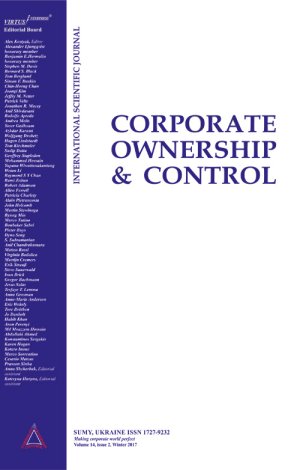
-
 Journal menu
Journal menu

- General information
- Editorial Board and External Reviewers
- Journal Policies
- Publication Ethics and Malpractice Statement
- Instructions for authors
- Paper reviewing
- Article processing charge
- Feedback from stakeholders
- Journal’s Open Access statement
- Order hard copies of the journal
- 50 most cited papers in the journal
BOARD STRUCTURE, INSTITUTIONAL PRESSURES AND CORPORATE VOLUNTARY DISCLOSURES
Download This ArticleAbstract
Corporate disclosure has been subjected to calls for corporate transparency by corporate governance movement as a matter of good corporate governance. Managers face substantial pressure to make more transparent disclosure of their activities to promote efficient governance of their companies or risk losing legitimacy from the perspectives of the investors and other stakeholders. Using the annual reports of 155 Malaysian listed companies, this study investigates the competing effects of board structure and institutional pressures on the extent and credibility of corporate voluntary disclosure during the period when public listed companies in Malaysia faced new corporate governance regulation. This study provides evidence that under the influence of dominant owners on board, management voluntary disclosure decisions are driven by mimetic pressures when their company is structured to meet expectations of good corporate governance. Managers’ voluntary disclosure strategy to gain legitimacy seems to override their incentives to disclose credible information to outside investors. This inference is consistent with the evidence that management voluntary disclosures are not viewed as credible by outside investors. These findings contribute to a better understanding of the relationships between various board structures and institutional pressures on management disclosure decisions in particular agency settings.
Keywords: Voluntary Disclosure; Board Structure; Institutional Pressures; Legitimacy.
How to cite this paper: Arshad, R., Atan, R., Darus, F. (2009). Board structure, institutional pressures and corporate voluntary disclosures. Corporate Ownership & Control, 6(3-3),360-370. https://doi.org/10.22495/cocv6i3c3p2

















